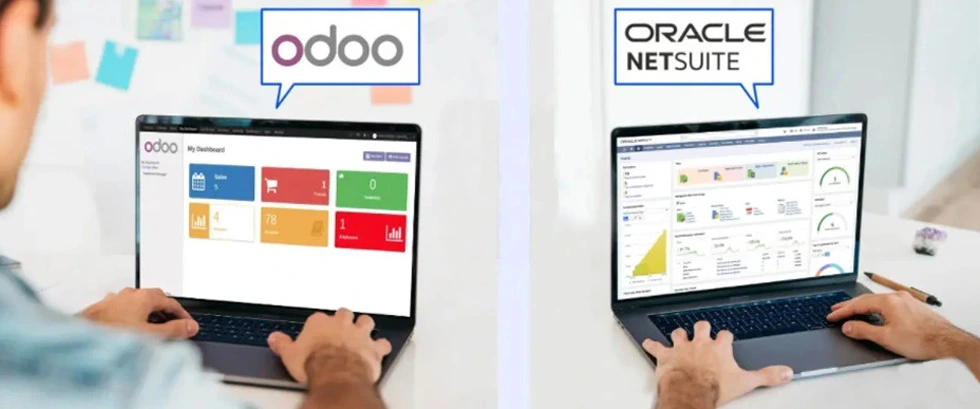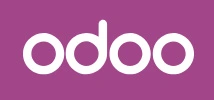Let's Talk

Choosing the best ERP software for businesses can be a challenging task, especially with so many options available in the market. For companies that are scaling or just starting out, finding the right solution to manage operations, accounting, and customer relationships is crucial. That’s where ERP software comes in.
For small and medium enterprises, selecting the ERP software for SMEs that aligns with their unique needs and budgets is even more important. A system that offers flexibility, easy integration, and cost-effective pricing can help streamline workflows and improve efficiency.

When comparing popular platforms like Odoo and NetSuite, it’s essential to understand how open-source ERP vs cloud-based ERP solutions differ. Open-source platforms like Odoo provide customization options, allowing businesses to tailor the software to their processes. Cloud-based solutions like NetSuite, on the other hand, offer scalability and robust features but often at a higher cost and with limited customization.
Both types of ERP systems offer advantages, and your choice should depend on your company’s goals, budget, and long-term strategy. By evaluating your needs carefully, you can select the right ERP that will grow with your business and help you stay competitive in today’s fast-paced environment.

Odoo is a cost-effective and comprehensive ERP platform designed to meet the needs of businesses of all sizes. As an open-source solution, it offers a fully integrated suite of applications that are easily customizable to align with unique workflows.
With Odoo, you can manage CRM, sales, project planning, manufacturing, inventory, accounting, human resources, marketing efforts, customer support, and much more—all within a unified platform.

NetSuite, supported by Oracle, is a popular cloud-based SaaS ERP solution trusted by organizations worldwide. It is divided into four major modules that work together to streamline business operations:
Choosing between Odoo and NetSuite depends heavily on your company’s individual requirements and growth ambitions. Both systems offer robust tools to enhance efficiency and scalability.
If affordability, adaptability, and customization are priorities, Odoo presents a compelling option. On the other hand, if you're aiming for an extensively scalable ERP with a deep focus on supply chain management, NetSuite may serve your needs better.
The final decision should be made in consultation with experienced ERP specialists to ensure you implement the right solution for your operations.
Before selecting between Odoo and NetSuite, consider these important factors:
NetSuite is less customizable and follows a more conventional structure, which means businesses need to adjust their processes to fit the software’s framework. This works for companies ready to align their workflows accordingly.
Odoo, however, offers unmatched flexibility. It allows businesses to tailor the system to meet their specific operational requirements, enabling them to overcome the limitations imposed by traditional ERP systems.
When comparing infrastructure, user experience, flexibility, and pricing, Odoo stands out as a cost-efficient yet powerful alternative to NetSuite.
Odoo’s pricing model is transparent and accessible, especially for SMEs. The base cost is around $25 per user per month, while NetSuite’s entry point starts at $125 per user per month—making NetSuite nearly five times more expensive for licensing alone.
Furthermore, Odoo’s reliance on Python and XML makes it easier and more affordable to hire developers compared to NetSuite’s proprietary SuiteScript language.
For businesses seeking functional, adaptable ERP solutions without breaking the bank, Odoo offers an ideal pathway.
Odoo’s modular approach simplifies implementation and configuration. NetSuite, although improving, still faces challenges in offering seamless deployment for complex manufacturing, distribution, and retail processes.
For organizations with intricate operational requirements, Odoo’s ease of setup gives it a competitive edge.
Both platforms provide robust support for sales teams, but Odoo includes additional features like electronic signature integration and customizable quotation templates, enhancing workflow efficiency. Odoo’s POS also extends to restaurant management, unlike NetSuite.
NetSuite offers real-time dashboards covering financials and customer data. However, Odoo’s modular structure allows deeper, more detailed reporting across a broader range of business processes.
While NetSuite provides strong CRM tools, Odoo’s interface—especially its intuitive Kanban view—makes managing customer interactions more efficient.
 Accounting
Accounting
Odoo excels with smart alerts and batch actions that streamline accounting tasks. Additionally, it supports transactions across more countries, making it a better option for global businesses.
 Communications
Communications
Odoo’s built-in live chat feature enhances both internal collaboration and customer interactions, helping teams communicate effectively without leaving the platform.
 Technical Specifications
Technical Specifications
NetSuite’s data storage and migration have been criticized for complexity, while Odoo allows easy database backups and more flexible hosting options. Odoo’s use of widely adopted programming languages also makes it more user-friendly.
The hosting options are limited for NetSuite. Businesses can only use NetSuite hosting for the software, which may mean less flexibility in terms of hosting prices. NetSuite's reliance on javascript and "Suitescript" also make it expensive and difficult to use.
 India Office
India Office
601,Webel Tower I ,BN-4,
Sector V, Salt Lake,
Kolkata-91,WB,India
 Bangladesh Office
Bangladesh Office
GA-99/5, Rahima Tower (6th Floor) ,Badda Link Road, Middle Badda,
Dhaka-1212.
 UAE - Dubai
UAE - Dubai
Plot No: 78, Makani no: 30375 95622,
Building: Assalam, 3rd Floor,
PO Box: 381257, AI Rega
(In front of AI Ghurair Shopping Mall),
Dubai, UAE
 UK Office
UK Office
Suit 63 24-28 St.Leonards Road, SL4 3BB - Windsor
Berkshire (GB)
United Kingdom